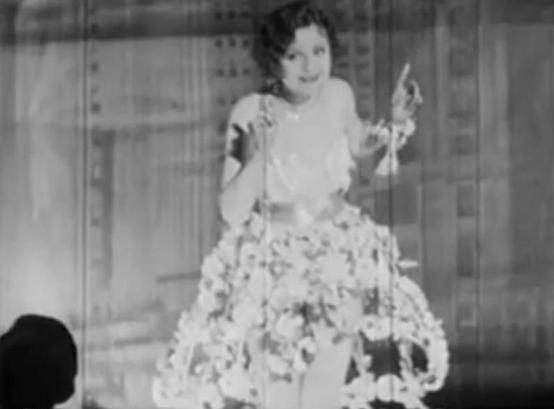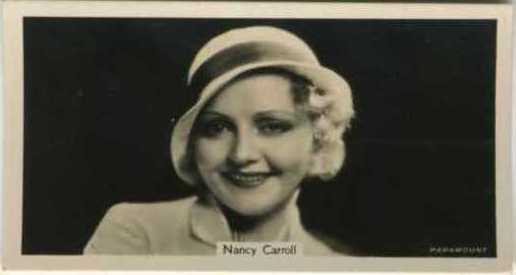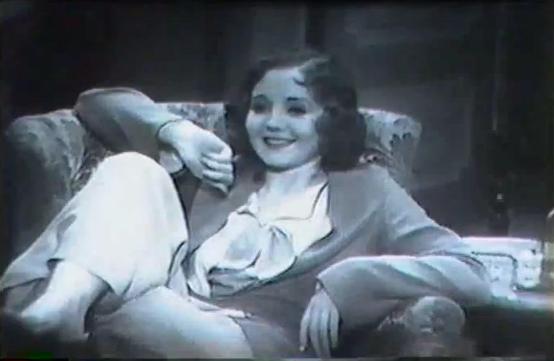 I sat down to write about Child of Manhattan (1933) and wound up working on two different posts, neither about that particular movie. The star of that film, Nancy Carroll, had so captivated me that I needed to learn just a little more about her.
I sat down to write about Child of Manhattan (1933) and wound up working on two different posts, neither about that particular movie. The star of that film, Nancy Carroll, had so captivated me that I needed to learn just a little more about her.
I had watched Child of Manhattan, a Columbia film, on Turner Classic Movies a few weeks ago. In it Carroll, Manhattan born herself as Ann Veronica Lahiff in 1903, plays Madelaine McGonagle, a down-to-earth dance hall girl. Madelaine plies her trade at Loveland, a club that’s just one little piece of Manhattan owned by Paul Vanderkill (John Boles), who is soon as enchanted by Carroll’s Madelaine as we are.
Working girl Madelaine is overcome by Paul’s attentions and seems perfectly content to be his mistress. When she becomes pregnant Paul shocks her by proposing marriage, but Madelaine becomes conflicted after losing the baby. Convinced that Paul had only married her for the sake of the child Madelaine bolts and this is when Nancy Carroll elevates her performance beyond charm and personality, sacrificing herself in a manner reminiscent of Stanwyck and pulling it off in just as convincing fashion.
When I sat down to dig in to Child of Manhattan I needed to know more about Nancy Carroll. And here we are.
Carroll’s career largely escapes notice today because the bulk of her work was done for Paramount, including 25 of her first 31 films. Those movies, now owned by Universal, are rarely shown on television or released to video. One exception that had made it to DVD is Hot Saturday (1932), which saw Nancy act as romantic interest to both Cary Grant and Randolph Scott. It’s a great showcase for Nancy, even if most people are tuning in to see young Cary Grant. I’ll point you towards finding some of Nancy’s other movies at the end of this post.
 Carroll began her theatrical career over objections from her parents alongside older sister Terry as a chorus girl in New York. Their uncle was colorful Broadway restaurateur Billy Lahiff, whose tavern became one of Nancy’s New York night spots. Nancy’s first part in a major Broadway show came for the Shuberts in their revue The Passing Show of 1923. She married playwright Jack Kirkland in 1924 and after the birth of their daughter, Patricia, the following year the Kirklands went west, arriving in Hollywood in 1926. Movie talent scouts took notice of Nancy playing Roxie Hart in Chicago at a Hollywood theater and Paramount soon signed her to play in their film adaptation of the Broadway mega-hit Abie’s Irish Rose (1928).
Carroll began her theatrical career over objections from her parents alongside older sister Terry as a chorus girl in New York. Their uncle was colorful Broadway restaurateur Billy Lahiff, whose tavern became one of Nancy’s New York night spots. Nancy’s first part in a major Broadway show came for the Shuberts in their revue The Passing Show of 1923. She married playwright Jack Kirkland in 1924 and after the birth of their daughter, Patricia, the following year the Kirklands went west, arriving in Hollywood in 1926. Movie talent scouts took notice of Nancy playing Roxie Hart in Chicago at a Hollywood theater and Paramount soon signed her to play in their film adaptation of the Broadway mega-hit Abie’s Irish Rose (1928).
While the movie version of Abie’s Irish Rose couldn’t hope to live up to the then unprecedented six year run it had had on Broadway, Carroll stood out in the early song and dance scene added to the movie after initial filming. Paramount capitalized on the attention by starring her opposite Richard Dix in the comedy Easy Come, Easy Go (1928). That title was a hit, but even bigger was the 1928 version of The Shopworn Angel, which saw Nancy cast as a showgirl opposite Gary Cooper’s soldier. Once again Nancy was boosted by the talking and singing scenes added to this mostly silent feature.
She was re-teamed with Abie’s Irish Rose co-star Charles “Buddy” Rogers in the backstage musical drama Illusion (1929) and two popular musical comedies, Close Harmony (1929) and Follow Thru (1930). Nancy really lit up the screen in Follow Thru, which was filmed in blazing two-strip Technicolor. Here’s a screen capture from my copy:
In 1929 Carroll also played the part that put over the aforementioned Stanwyck on Broadway when she appeared in Paramount’s screen adaptation of Burlesque, which was retitled The Dance of Life but still featured Stanwyck’s co-star from the stage, Hal Skelly, opposite Nancy. In this one Carroll played another down on her luck showgirl who spends the first half of the movie singing and dancing with Skelly and the second half more dramatically trying to overcome his alcoholism and the havoc it’s wreaked upon their marriage.
She didn’t sing or dance in Edmund Goulding’s The Devil’s Holiday (1930), but was instead a mercenary manicurist who rides Phillips Holmes’ affections straight to the altar. While Holmes is permanently lovestruck the rest of his family sees Carroll for what she is and no one is surprised when she immediately accepts a cash settlement to bolt back to the city and never toy with golden boy Holmes again. A terrible accident befalls Holmes before Nancy departs and once back home, trying to live for kicks and spend her dough, she can’t get the kid out of her mind.
The Devil’s Holiday was Nancy’s most dramatic offering yet and earned her an Academy Award nomination that she supposedly came very close to winning.
In those earliest years of the thirties Nancy was a major hit with the public and critics alike. She was said to receive more fan mail than any other Hollywood star. She continued to score well in the musical comedy Honey (1930); as a showgirl married to Frank Morgan but having an affair with Fredric March in Laughter (1930); and re-teamed with Phillips Holmes in the hit Stolen Heaven (1931). Unfortunately Nancy’s reunion with Edmund Goulding didn’t go well in The Night Angel (1931) and her final pairing with Holmes, in Ernst Lubitch’s Broken Lullaby (1932), was a major flop at the time though is much better appreciated today.
Paramount decided against renewing Nancy’s contract when it expired in 1933 and in May 1934 she signed a deal with Columbia, where she had previously worked in Child of Manhattan. She appeared in four movies for Columbia over the next couple of years, but even Nancy referred to those as “B” titles. In a 1935 Screen & Radio Weekly profile, Nancy acknowledged that her temperament may have damaged her Hollywood standing but seemed conflicted over the idea of being more cooperative:
“Now that I have become somewhat seasoned, I have discovered that it doesn’t pay to fight too much. Yet, since I have stopped fighting, my pictures are not always as satisfactory as they were when I was getting a reputation for being unmanageable. I never was temperamental, but on Broadway I got that reputation. I admit I often fought about my parts. It seems to me, if one can act it is only fair to be given a chance to interpret a part to the best of one’s ability, and I believe an experienced player knows more about what to do with a role than a director.”
After the Columbia deal expired Carroll was off the screen for a couple of years. She had divorced Kirkland back in 1931, the year in which she was said to have had a quick affair with Joe Kennedy, but Nancy had remarried before the calendar flipped to 1932. By 1935 that second marriage, to Francis Bolton Mallory, who had been editor of humor magazine Life when they married, was even shakier than her career: They divorced that summer.
“Eventually I decided I couldn’t go on any longer. I chucked everything. I got a divorce from my husband and I quit the movies flat. I spent a year in Europe, mostly in County Claire in Ireland, where my mother was born” (’Broken Heart’).
Carroll was back in Hollywood in 1938 and appeared in her final two movies in quick succession. She was no longer the star, but a supporting actress playing in the Deanna Durbin title That Certain Age and causing trouble for Virginia Bruce in There Goes My Heart. After that she returned to the theater, but Carroll’s press clippings soon pointed more towards the role of supportive parent. She and ex-husband Jack Kirkland were both in the audience when 18-year-old daughter Patricia made her Broadway debut in 1944.Carroll gained her next bit of national attention when she took over as the wife on TV’s The Aldrich Family during the 1950-51 season. She followed up with a number of appearances on The Egg and I playing the mother of real-life daughter Pat Kirkland, who starred on the show.
Nancy married again in 1953. Her third husband, C.H.J. Groen, was a Dutch Indonesian businessman with factories in Indonesia and Mexico, where Nancy settled for a time during the 1950s. The acting bug bit once again in the late 1950s.
As Nancy recounted in a 1963 interview, at a time when she was getting ready to tour with the road show for Never Too Late, “I’ve been an expatriate for 10 years living in Indonesia and Mexico. I go to Mexico City College in desperation, taking everything … had to come here for a television appearance in Naked City and after that taste of acting again, I began sniffing for new roles.”
When Nancy failed to appear at a scheduled performance of Never Too Late at the Tappan Zee Playhouse in Tappan, New York, her daughter Patricia notified the police. She went with a detective to her mother’s apartment and discovered her body. Nancy Carroll had died of an aneurysm, August 6, 1965. She was 61. Besides her daughter and third husband she was survived by four grandchildren.
She never appeared in a movie for MGM and has just one Warner Brothers title, 1932’s Scarlet Dawn, on her list of screen credits. Even her credits for Fox are limited to three early silent films and 1934’s Springtime for Henry. And so, largely by virtue of what is available and allowed to be shown today, Nancy Carroll’s screen legacy has been marginalized.
 While I mentioned movies co-starring Nancy with actors such as Gary Cooper, Fredric March and Cary Grant, none of them are titles typically sought out by fans of these better known stars. Nancy Carroll was, for the most part, the star of her films and so today when we celebrate the legends of classic film we rarely find her co-starring alongside them.
While I mentioned movies co-starring Nancy with actors such as Gary Cooper, Fredric March and Cary Grant, none of them are titles typically sought out by fans of these better known stars. Nancy Carroll was, for the most part, the star of her films and so today when we celebrate the legends of classic film we rarely find her co-starring alongside them.
To rediscover Nancy Carroll you have to look for Nancy Carroll movies.
You can pick up Universal’s Pre-Code Hollywood Collection to catch her in Hot Saturday, but it becomes more of an effort from there. I caught Child of Manhattan on TCM recently, but all that is scheduled in the near future as I write this is her final film, There Goes My Heart, on September 20. That one, starring Virginia Bruce and Fredric March, plays quite often on the popular cable channel.
Luckily many of Nancy’s Paramount titles do exist, they’re just hidden from plain view. While you might luck into them occasionally at your nearby repertory theater, many can also be found on the DVD gray market and such places as YouTube, where I watched The Dance of Life, The Devil’s Holiday and Broken Lullaby this past week. It’s worth the effort.
One book has been written about Nancy, 1969’s The Films of Nancy Carroll by Paul L. Nemcek. It’s long out of print, but used copies are widely available online. Also check out the Child of Manhattan website, which has been online many years now. They were one of the first sites I ever exchanged links with back when such behavior was encouraged!
At the top I mentioned that I planned on two posts about Nancy Carroll and neither of them would be about Child of Manhattan. Look for something about The Devil’s Holiday, the film that earned Nancy her Academy Award nomination, in the coming days.
Sources
- “Actress Nancy Carroll Resumes Stage Career.” The Palm Beach Post 30 Jul 1963: 3. Web. Google News. 14 Sep 2013.
- ”Broken Heart on Mend” Charleston Daily Mail 7 Aug 1938: 23. Web. Newspaper Archive. 16 Sep 2013.
- Dietz, Edith. “Nancy Carroll Counts Cost of Success.” Oakland Tribune 21 Jul 1935: 32. Web. Newspaper Archive. 14 Sep 2013.
[phpbaysidebar title=”Nancy Carroll on eBay” keywords=”Nancy Carroll” category=”45100″ num=”5″ siteid=”1″ sort=”EndTimeSoonest” minprice=”39″ maxprice=”599″ id=”2″]










Where did you get your copy of FOLLOW THRU? I saw the film at UCLA some years ago and thought it was delightful and always hoped that TCM would show it but it has yet to happen. Another Paramount film from the 30’s I have also hoped to get is LOVE ON TOAST, directed by E. A. Dupont but closer to a screwball comedy.
Hey Jeff,
I got my copy from an iOffer seller who has unfortunately, erm, disappeared from the site. He hasn’t answered my last email too, so that may count as a dried up source.
Anyway, check my FindOldMovies search engine: https://immortalephemera.com/find-old-movies/ I just updated it last night to clear out sellers who have disappeared but I still see copies of both of the titles you mention coming up as available.
Cliff
Wonderful post! I really liked Nancy Carroll in Follow Thru, that’s one of my favorite early musicals (and yay for it being a golf musical!!!). I didn’t know much about her so this was very informative. Thank you.
Raquel, we chatted golf-musicals on Twitter after this (‘Love in the Rough’) but wanted to chime in here to say thanks for your comment. Hope you get to catch Miss Carroll in a few more titles.
Nancy Carroll was my first “love” – I just fell in love with her photos in
John Springer’s book “All Talking, All Singing, All Dancing” but it
took me about 45 years to get my hand on one of her movies. And
she definitely lived up to my expectations. I think she was completely
unique and one of a kind, no one could forget her beautiful, melodious
voice and she sang gorgeously too.
I have seen her in a few films – I love “Honey”, “Sweetie” and “Dance of
Life” but she was just as good in dramatic roles as well – “The Devil’s
Holiday” and “Stolen Heaven”. Don’t worry about me – just the ravings
of a Nancy Carroll nut!!!
Was lucky enough to see her in FOLLOW THRU at UCLA after they restored it, and she is quite good in Lubitsch’s somewhat problematic THE MAN I KILLED, which is available on home video.
Jeff, do you know if The Man I Killed aka Broken Lullaby has a Region 1 release — I see a few copies being offered on Amazon, but they all appear to be Region 2. I had to find it on YouTube to see it. Thanks, Cliff
My mistake-I got this title mixed up with THE EAGLE AND THE HAWK. I think I have THE MAN I KILLED on a DVD-R that either was done for me off the Universal LD box set or from a TCM showing. Sorry for the mix-up.
Thanks for the clarification, Jeff, I’m going to stop looking then 🙂
I have to see Stolen Heaven yet, though I’m planning to get my hands on a copy before the end of the month–I really enjoy co-star Phillips Holmes too. She’s a delight in everything I’ve seen her in so far, though I must confess (I don’t think I have yet) that I didn’t particularly care for Follow Thru (But admit I’m in the minority there).
Thanks again, Diane!
I agree with you Cliff that “Follow Thru” is not among my favourites
either. I thought the “golfie musical” (only in the early thirties) and I
hate to admit it, was done much better in “Love in the Rough”.
My wife and I really liked Night Angel. We thought Nancy Carroll’s acting was Oscar Winning. Also at the top of our list is Broken Lullaby and Stolen Heaven.
I like both Broken Lullaby and Stolen Heaven too, though I’ve yet to see Night Angel. I just picked up a copy of Laughter, which I’ll be watching soon, though my favorite Carroll talkie is still Child of Manhattan. I’ll have to make a note to grab Night Angel during my next spree.
We got Night Angel from Loving the Classics. One copy was bad and wouldn’t play the end. Good customer service as they are, they sent another but it skipped also. We are getting another copy from Gary McNerney and he said that he is very fussy about quality. Despite the difficult viewings, my wife and I agree that this is amongst Nancy Carroll’s best acting.
Thanks, Thomas. I’ve got a few go-to sources (they’re in my Find Old Movies search engine) that have this one on hand. Just a matter of my making a note and remembering to order it!
Great tip. It’s always good to have additional sources.